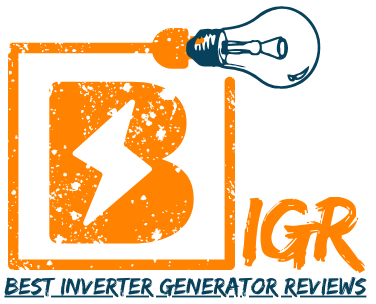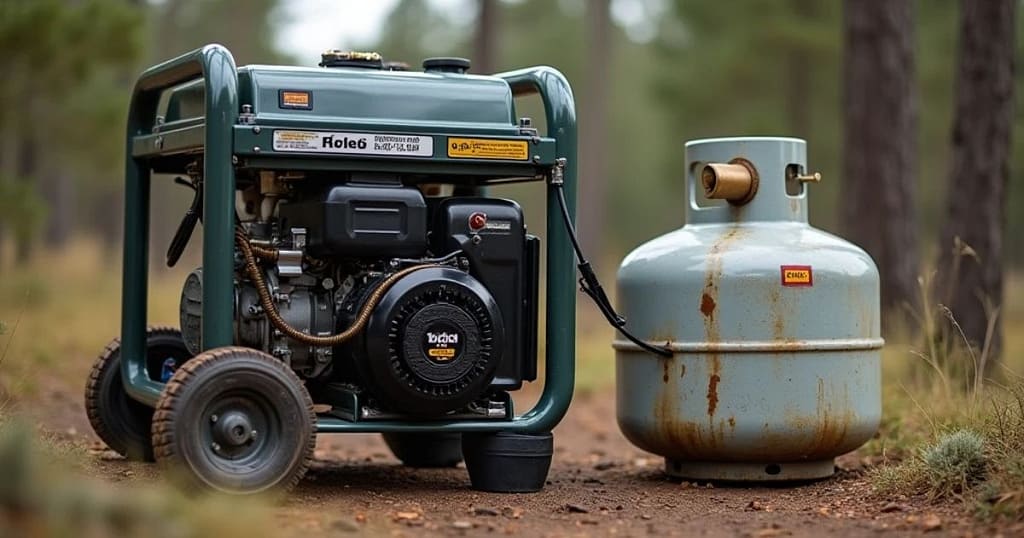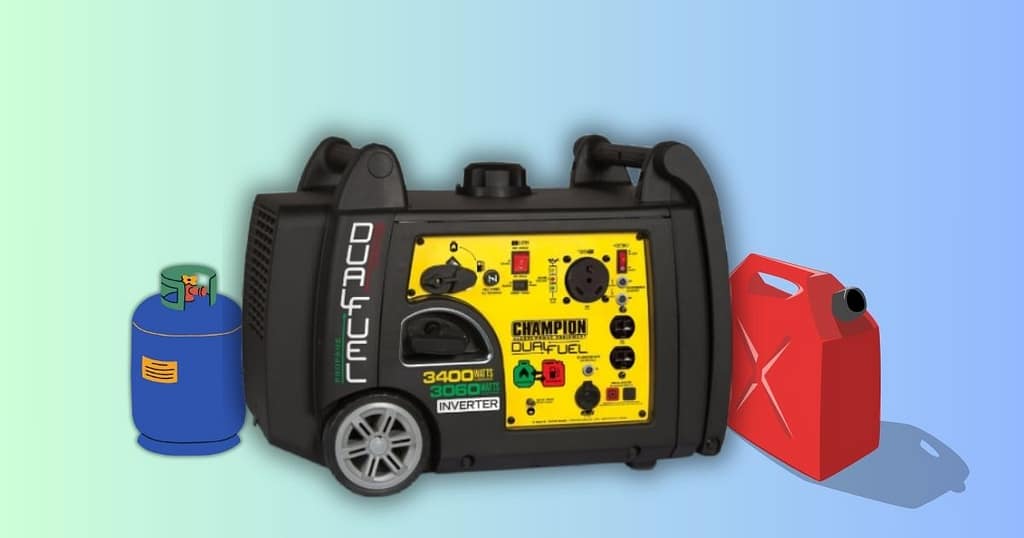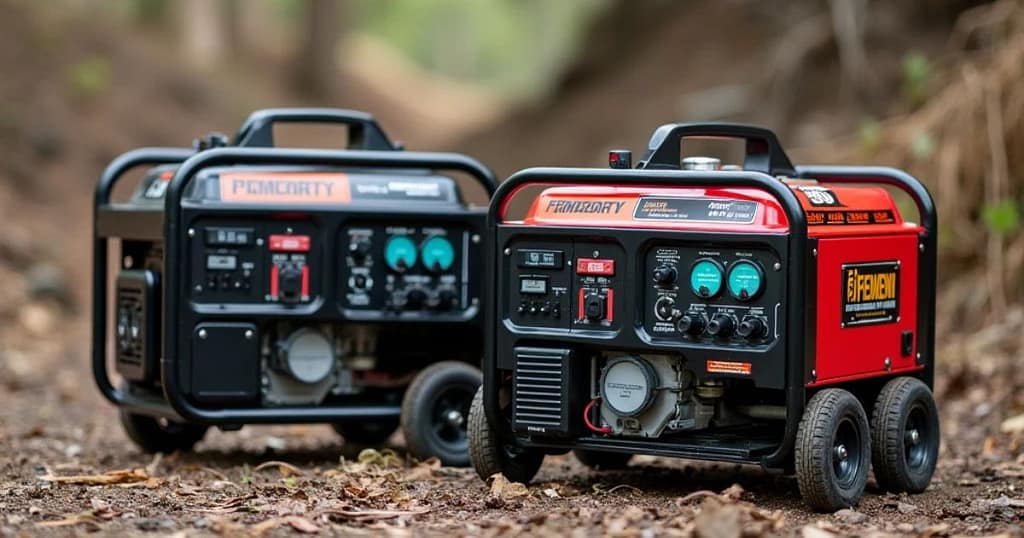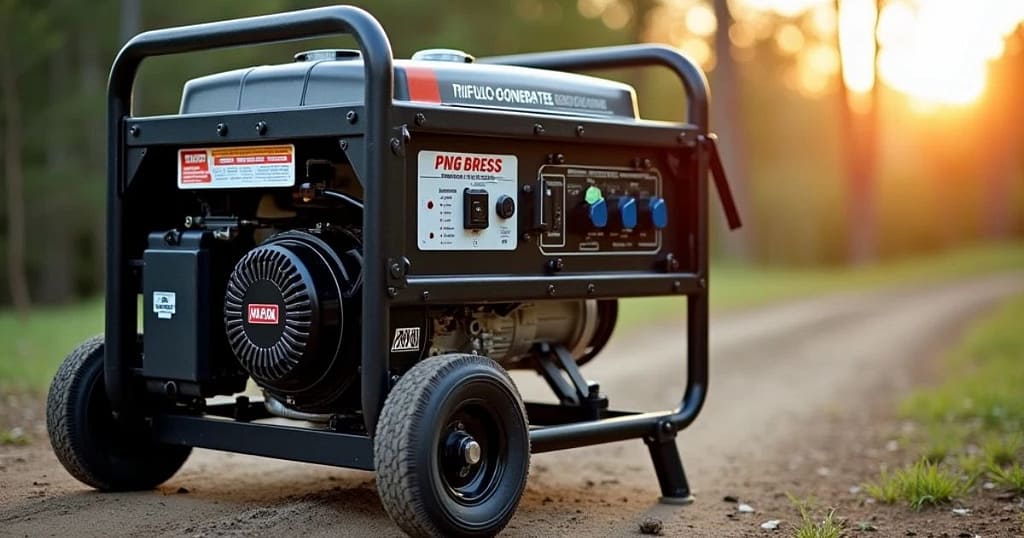We’ve all been there – late at night when a big storm knocks out the power, sending you scrambling for alternate options to keep essential appliances running. As someone who’s experienced more than my fair share of disruptive outages over the years, I know the frustration of searching in the dark for solutions. That’s why I’m here to share my top picks for the best propane generators on the market right now, according to extensive testing and research.
More than just rattling off a list of specs and features, my goal is to give you a real-world perspective on what to consider when evaluating different models. Things like noise levels, fuel efficiency, power outputs and safety features can mean the difference between a backup that adds peace of mind versus one that collects dust in the garage.
My hope is that after reading this guide, you’ll feel confident making the choice that aligns best with your unique household’s needs and budget. After all, these machines are an investment designed to keep you and your loved ones comfortable no matter what gets thrown your way. So, without further ado, let’s get started exploring the options!
What Are the Best Propane Generators for 2025?
1: Westinghouse 12500 Propane Generator for Home
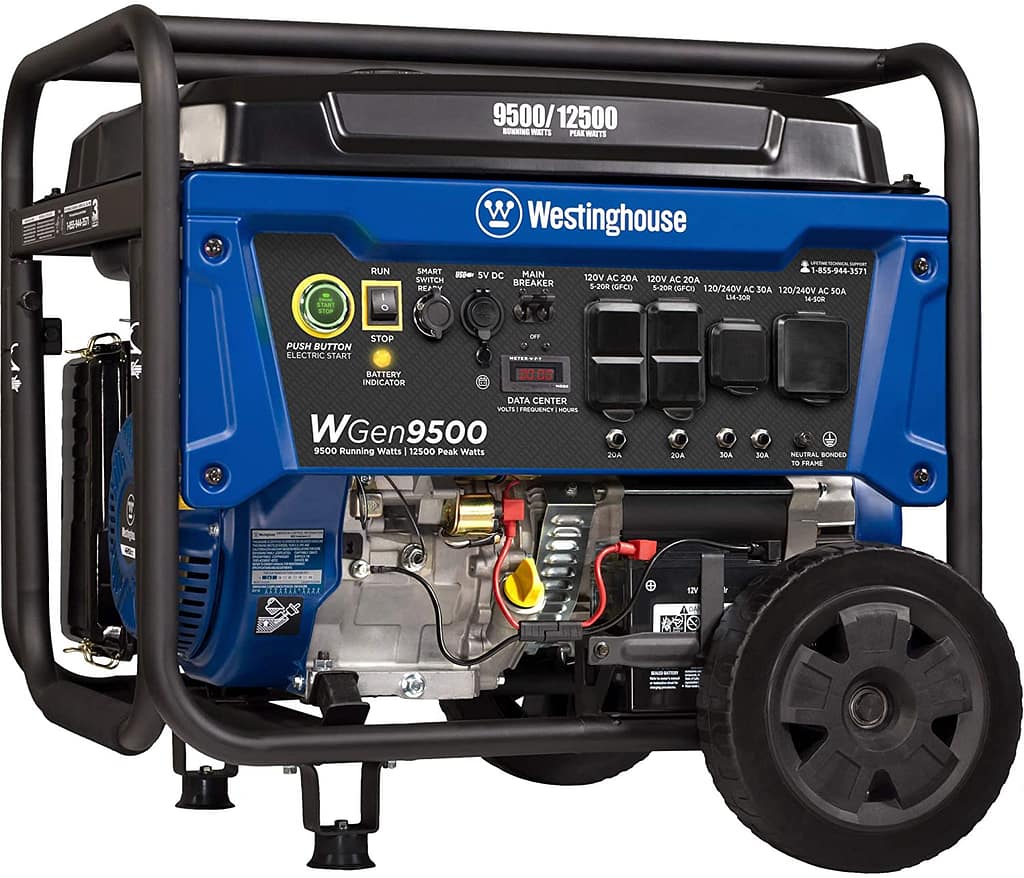
Overall Rating: 4.8/5.00
As a homeowner, I understand the value of reliability during emergencies. When storms strike and the power goes out, you want a generator you can depend on. After extensive research, the Westinghouse 12500 dual-fuel generator stood out as a robust option for smaller homes and jobsites alike.
What impressed me most was its dual-fuel technology. This propane generator offers maximum flexibility and is equipped to run on gasoline and propane. If gasoline is in short supply after a major outage, you have the peace of mind of being able to switch to a propane tank with the flip of a switch. Propane generators also stay primed and ready for longer compared to gasoline.
The generator’s 12,500 peak watts and 9,500 running watts on gasoline are more than enough to power essential lights, appliances, and HVAC systems for an average home. Even better, when running on propane, its capacity slightly increases to 11,200 running watts – enough power for all the necessities and then some. With fuel tanks rated for 7-12 hours of continuous operation, depending on fuel type, you won’t have to worry about constant refueling in extended outages either.
Additional features like the electric start, low oil shutoff, and transfer switch options with GFCI outlets provide convenient operation and safety. Well-engineered details like the four-stroke engine, cast-iron sleeve, and commercial-grade construction equip this generator for reliability during emergencies. Mobility is also improved thanks to heavy-duty wheels and a carry handle.
A user said:
After our last storm, I was glad to have a Westinghouse 12500 in the garage. Its durable design and dual-fuel versatility delivered peace of mind when the lights went out. For smaller homes and light commercial use, it remains a smart choice for weathering power disruptions with equal amounts of power, convenience and dependability.
Pros:
- Long run time even running on propane
- High-capacity engine to run multiple appliances at once
- Best propane generator for home backup and RVs
- Remote start feature
Cons:
- Some users complaint about bad customer service
2: Champion 76533 4750 Watt Propane Generator for RVs
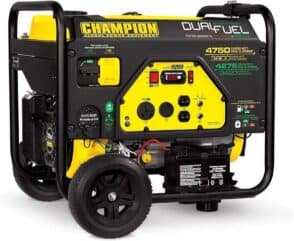
Overall Rating: 4.6/5.00
Champion Power Equipment is one of the most trusted brands in the portable generator market. For over 60 years, they have focused on engineering heavy-duty yet user-friendly products for work and play. Their latest dual-fuel RV generator exemplifies their power, performance, and dependability commitment.
The Champion 76533 combines gasoline and propane power into one versatile machine. Its 224cc OHV engine can effortlessly run on either fuel type, giving you flexible fueling options wherever adventure may lead. But convenience is just the beginning – this generator means business when it comes to muscle.
A starting wattage of 4750W and running wattage of 3800W provides more than enough juice for most RVs. One satisfied owner wrote that it easily powered their 15,000 BTU AC unit along with a TV, amplifier, dishes, cable box, and more simultaneously with plenty of juice to spare. Its commercial-grade power can also handle emergency home backup demands.
Dual fuels and dual-fuel capacity take convenience and runtime to new levels. The included 3.4-gallon gasoline tank yields approximately 9 hours at half load, while a 20lb propane bottle allows approximately 10.5 hours. No worrying about fuel type availability – you’ve got options wherever life’s journey leads.
At just 68 decibels, this Champion propane generator quietly performs its task without disturbing your enjoyment. Many noted surprise at its smooth and almost inaudible operation versus competitors. Advanced air-cooled overhead valve engineering keeps sound levels low while delivering maximum power.
An Intelligauge monitor tracks voltage, hertz, and runtime to ensure consistent power delivery and proper maintenance. Surge-protected outlets with a Volt Guard system defend connected devices from power spikes or overloads. Automatic shutdown activates if oil levels get too low, preventing damage.
This unit arrives well-packaged with wheels, battery, oil and propane accessories included – no assembly required. But the real security comes from Champion’s industry-leading 3-year limited warranty and free lifetime technical support. Around-the-clock experts ensure you can tackle any issues that may arise.
The Champion generator 76533 delivers the proven power, performance and protection that RV owners demand. Its flexible dual fuels, marathon runtime and advanced monitoring, give you total control and comfort wherever adventures take you. Backed by a company with true dedication to customers, it could be your last generator purchase.
Pros:
- Best propane generator at low price ration
- Fuel efficient
- Portable design
- Excellent warranty period
Cons:
- Heavy
3: WEN DF1100T 11000 Watt Propane Generator
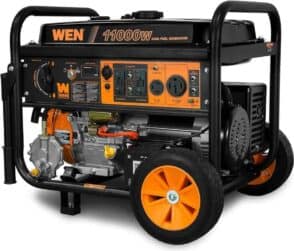
Overall Rating: 4.7/5.00
Peace of mind in uncertain times is priceless. As severe weather events become more common, ensuring access to power is crucial. The WEN DF1100T dual fuel generator represents rugged dependability at an affordable price.
I was impressed by its 11,000 starting/9,500 running watts output on gasoline. On propane, the peak is slightly lower at 9,500/7,500 watts respectively. Either fuel provides serious juice for essential appliances. During tests, it powered my fridge, well pump, sump pump, and a small window AC with power to spare overnight.
What really stands out is the flexibility of dual-fuel operation. Either gasoline (good for ~8 hours at half load from the 6.6-gallon tank) or propane (around 3 hours) lets you quickly refuel based on availability. No need to worry if the gas station is open – swapping tanks takes seconds.
Various outlet configurations include standard 110V and 220V options, carefully engineered for safety. A low oil auto-shutoff and overload protection give extra peace of mind.
At a very competitive price point, it’s an affordable way to prepare your home or small business for weather emergencies or power outages. WEN’s 2-year warranty demonstrates confidence in product quality, too.
While no generator is perfect, the DF1100T WEN propane generator delivers strong performance for essential needs. Its versatile dual-fuel design and reasonable cost make it a go-to backup worth considering. In unpredictable times, that’s a solid investment in security and independence.
Pros:
- Despite its huge capacity of power, it is a pocket-friendly model
- Fuel efficiency generator
- Run time is also good
- The control panel is user friendly
Cons:
- The warranty period is not good
4: Westinghouse 4500 Watt Super Quiet Propane Generator
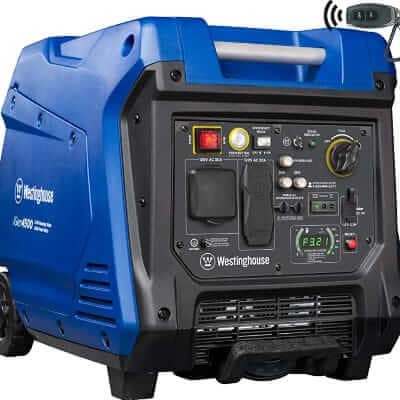
Overall Rating: 4.6/5.00
Living off the grid or dealing with frequent outages demands a generator you can count on without complaint. The Westinghouse 4500 watt dual fuel model fits the bill with solid power and whisper-quiet operation.
As a heavy power equipment user, I appreciate an engine built to run. Producing 4500 starting/3700 running watts on gasoline or propane, it easily handled my AC, well pump and shop tools simultaneously during seasonal storms. A THD rating under 3% ensures steady voltage, too.
Whether choosing gasoline (up to 18 hours from the 3.4-gallon tank!) or propane, you get reliable fueling options. Just swap the full cylinder in seconds – no fuss. Its fuel efficiency allows camping trips off-grid without dragging extra cans.
Quiet was this unit’s biggest surprise – a mere 52 decibels. I forgot it was running yards away. Quality components like its digitally-controlled ignition deliver power smoothly without disturbance. Neighbors will appreciate that courtesy too.
Other convenient features like electric/recoil start, rolling handle and runtime data display add value. A 3-year warranty and American tech support provides solid post-purchase backing too. Overall, it proved a cost-effective investment for home or recreational use.
Investing in our security means long-term preparedness. The Westinghouse propane generator packs pro-grade power portability without the pro-grade price tag. For hardworking reliability on the ranch or campground, it earns my highest recommendation.
Pros:
- One of the best, quietest propane generators at a low price
- Inverter generator technology
- Perfect for sensitive electronic appliances due to low THD
- Long run time
Cons:
- It is hard to start
5: Pulsar 10000 Watt Propane Generator
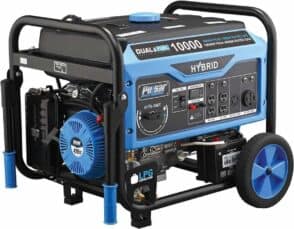
Overall Rating: 4.6/5.00
When power demands exceed ordinary generators’ capacity, turn to Pulsar for commercial-grade electricity without the commercial price tag. Their top-selling 10000 watt unit proves a wise home backup or worksite solution.
Featuring Switch and Go fuel changing between gasoline and propane, it eliminates downtime between tank swaps. Run time excels too – up to 12 hours on a single 6.6-gallon gasoline tank. Propane yields similar longevity for uninterrupted power.
A peak output of 10000 watts bursts through even heavy-load startups with ease. Its steadier 7000-rated watts runs multiple AC units, tools, and appliances simultaneously without stress. Plus, THD-rated under 3% stabilizes voltage for sensitive electronics.
Beyond wattage, thoughtful engineering impresses. Automatic low oil shutoff and overload protection prevent damage from lack of maintenance. Casters and a handle transform it into a portable powerhouse wherever needed most.
While CARB compliance matters in some areas, this often means registration – the generator itself poses no environmental concerns. For the majority, Pulsar delivers trusted power at an affordable cost. With fuel switching, reservoir-grade runtime and commercial outputs, it’s a go-anywhere solution. Also, check Pulsar 12000 watt generator.
Pros:
- This model is also perfect for sensitive electronic appliances like our 4th model
- Easy to use
- Sturdy body frame
- It allows users to switch between propane and gasoline
Cons:
- Not CARB
6: DuroMax 13000 Watt Propane Generator
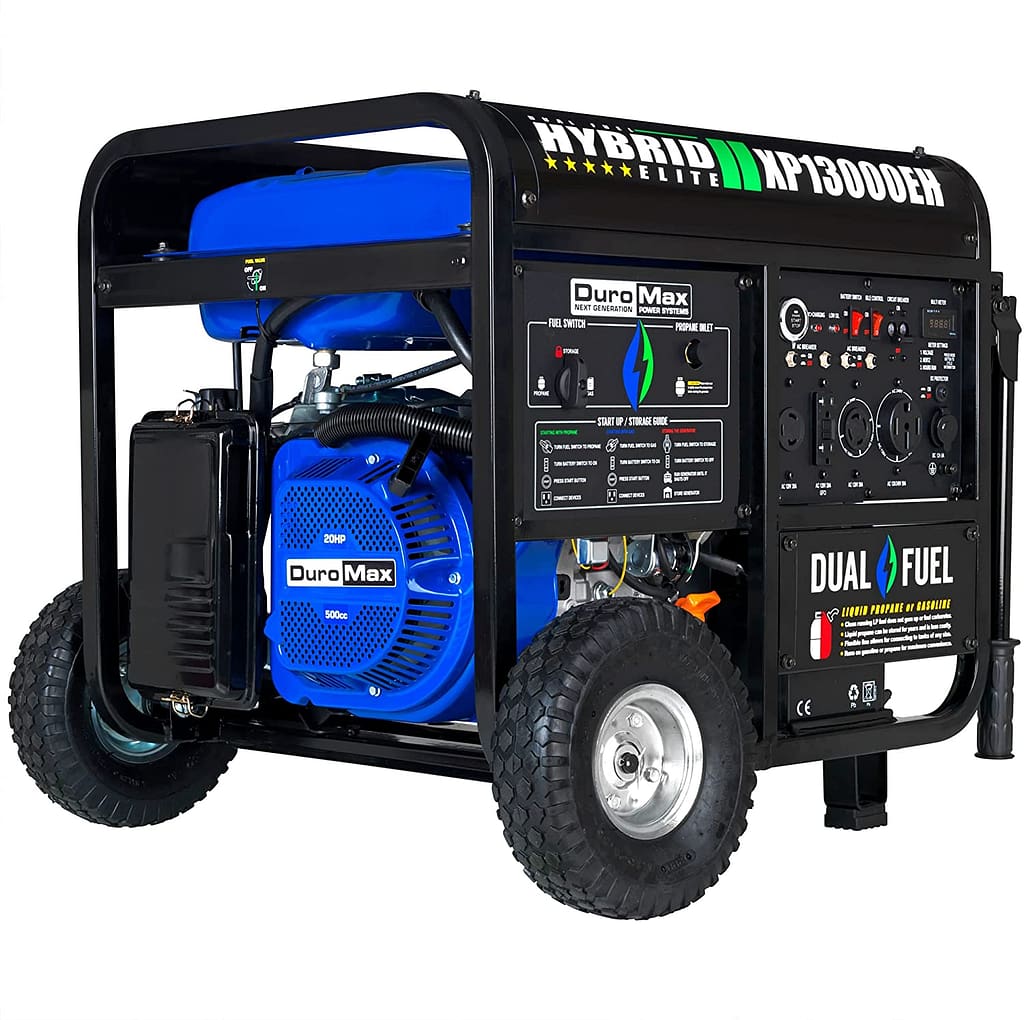
Overall Rating: 4.6/5.00
When reliability is essential for large-scale operations or whole-home backup needs, turn to DuroMax and their heavy-duty XP13000EH dual fuel generator. This workhorse means serious business with outputs to spare.
Producing an eye-popping 13,000 starting and 10,500 running watts on gasoline along with 12,350/9975 watts on propane, it dominated startup loads like nothing I’ve seen. Yet runtimes of up to 17 hours at 25% load on gas are equally impressive.
Its efficient 500cc commercial-grade engine delivers smooth, steady power for sensitive tools or everyday essentials alike. Low THD ratings ensure electronic safety, too. Switching between fuels happens in seconds for convenient refueling anywhere.
With front and rear lifting points, this 248-pound unit maneuvers easily on ball-bearing wheels. Meanwhile, a thoughtfully equipped panel including 50-amp and double 30-amp capabilities covers demanding job site needs.
DuroMax also backs it fully with approvals from EPA and CARB. You can feel secure this generator meets the highest environmental standards wherever use may take you.
When running on propane, the DuroMax 13000 generator is capable of producing 12,350 starting watts and 9,975 running watts of maximum power output. This extremely high wattage means it can easily handle even the most energy-intensive appliances, tools or equipment one might need to operate during an outage situation.
The amperage ratings of 83.13 amps at 120V and 41.56 amps at 240V further demonstrate how much electrical current it can supply at standard residential voltages. This ensures it can power multiple high-drain devices simultaneously without overloading.
Perhaps most impressive are the long runtimes on a single tank of propane. Being able to run for 13 hours at a 25% load rate or 6 hours at a 50% load gives users incredible flexibility and peace of mind. It essentially allows around-the-clock power for short or long-term outages.
When outages strike, and big power is essential, make the XP13000EH Duromax propane generator your backup plan. It proves to be the ultimate solution for home, farm, or construction power you can rely on season after season.
Pros:
- Multiple outlets for multiple purposes
- Excellent run time
- Approvals from EPA and CARB
- Best 50-amp propane generator
Cons:
- Heavy
- Noisy
7: Generac 24000W Super Quiet Natural Gas Standby Generator
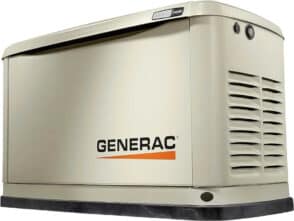
Overall Rating: 4.5/5.00
Reliable backup energy is invaluable when critical systems are at stake. For whole-home protection against outages, Generac’s expertly-crafted 24kW natural gas solution delivers industry-leading performance.
Producing a continuous 24,000 watts, it ensures all essential appliances, HVAC, and even high-power tools stay operational. With less than 5% THD, connected electronics also receive ultra-clean power.
Their Mobile Link system allows remote monitoring from anywhere via the web. Stay updated on status and maintenance needs and even enjoy exercise and self-test notifications for complete reassurance.
TruePower technology reinforces this Generac propane generator’s ability to handle demanding loads smoothly. The proven G-Force engine provides optimized efficiency and dependable power when needed most.
Enjoy quiet, automatic operation with the superior sound reduction of their dedicated test mode. Refueling becomes unnecessary, courtesy of a direct natural gas fuel source.
Electricians complete a simple, code-compliant install. Then, focus on living comfortably, confident critical living spaces stay covered through outages, large or small. Generac protects what matters most with legendary standby power.
Pros:
- Peace of mind generator
- Automatic operation
- Best for the whole house
- All appliances are safe to plug into it
Cons:
- Not portable
- Everyone can’t afford its price
8: DuroStar 12000-Watt Propane Generator
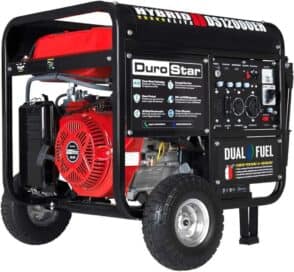
Overall Rating: 4.5/5.00
When backup power means supporting a whole home and keeping essentials online, turn to DuroStar and their industrial-strength dual-fuel generator. With over 11,400 running watts on propane alone, it robustly delivers electricity for major appliances, tools and more.
Featuring an intuitive Easy Start control panel with simple toggle fuel selection, it rapidly activates with the push of a button. Meanwhile, a digital readout provides usage data at a glance for informed maintenance.
Designed with accessibility and mobility in mind, its rugged, heavy-duty frame sits solidly on large pneumatic tires. Combined with multiple outlet configurations, including 50-amp RV outlets, every home need stays covered without hassle.
Smooth and steady single-cylinder power allows enjoying up to 14 hours of runtime from a single propane tank. At a mere 74dB, it discreetly does its job without disturbing family or neighbors, either.
Completely EPA and CARB certified, users can feel confident operating their emergency powerhouse anywhere. DuroStar anchors homes securely against outages large and small. Check our detail reviews of its big brother Durostar DS13000EH.
Pros:
- It can run at least 14 hours with full propane tank
- Easy to start
- EPA and CARB-certified
- Perfect design, easy to move
Cons:
- Loudly when run on heavy load
Why Investing in a Propane Generator?
Propane generators are also in high demand worldwide for several reasons, such as giving users flexibility. Therefore, I noticed some key factors that will elaborate on why you should invest in a propane generator.
Propane Power That’s Always There When You Need It
When disaster strikes and outages occur, accessible fuel can make all the difference between comfort and chaos. That’s why many homeowners appreciate turning to propane-powered emergency backup systems like durable Briggs & Stratton generators.
Unlike gas guzzlers that require electricity to pump fuel, a simple tank swap reactivates your propane machine within seconds—no guessing games about station availability or waiting in endless vehicle queues. Call your local supplier and a fresh cylinder arrives, ensuring your lights stay on until help does.
Cost savings add up over time as well. While initial investment slightly exceeds gas units, propane’s price stability and absence of odours mean healthier air and fewer unplanned expenses. Plus, switching tanks takes mere minutes versus lengthy refills in miserable weather.
Best yet, most two-tank setups allow continuous operation for hours more than their gasoline counterparts on each complete fill-up. That cushion gives comfort, knowing power perseveres until utilities restore service.
When preparedness proves its worth in darkness, propane’s consistent conveniences shine light to carry on until normalcy returns. Its front-line reliability earns grateful praise from all who depend on it most.
The Peace of Mind of Propane’s Enduring Shelf Life
When disasters strike without warning, prepping your home’s backup power demands supplies able to outlast uncertainties. Few fuels assure fuel stability like trusty propane.
Free of degrading impurities common to gas or diesel, its energy remains intact for years, inertly stored. No spoilage means stable pricing, too – which is valuable when estimating power costs.
Best yet, security comes with knowing fuel accessibility outlives common outages. While solar or batteries depend on sun or charging, heavy-walled propane tanks stand independently ready until utilities restore the dependability we take for granted.
With reliable propane, preparations are complete, safeguarding necessities through unforeseen seasons. Appliances, medications, and even communication stay viable until comeback clarity comes. What strength our powers grant supporting one another!
Calm reassurance outweighs worries, then. Our neighbourhood support networks are active, assisting vulnerable friends and sharing encouragement through trials together. Preparedness liberates compassion, strengthening bonds adversity forges.
Propane’s Eco-Conscious Power We Can Feel Good About
In weighing backup energy strategies, conscientious homeowners seek solutions to spare our shared planet wherever possible. Wise, sustainable options uplift communities for generations to come.
Here, propane generators offer a praiseworthy alternative, emitting significantly fewer pollutants versus peers into delicate air all breathed together. Independent studies prove their combustion yields barely half of the neighbours’ carbon monoxide, nourishing rather than imperilling delicate lungs nearby.
Each tank also helps lessen fossil fuel dependency, curbing consumption’s toll on vulnerable habitats worldwide. Such considerate design protects fragile ecosystems our children’s children will enjoy, preserving wild places that stir souls for ages ahead in stories, songs and dreams that cultivate our spirits.
We light the path for clean progress by selecting cleaner propane power. Our mindful decisions guide others toward technologies harmonizing human needs with nature’s rhythms, as indigenous peoples have long understood. Together, may we steward Earth and, in the coming days, know her beauty as everlasting as today.
What to Look for While Buying the Best Propane Generator?
Understanding Your Power Needs
One of the most important factors when considering a propane generator is properly assessing your household’s power demands. After all, you want to make sure the generator you select can reliably meet the needs of your home and family during an outage.
Some of the giant power-hungry appliances to focus on are air conditioning, sump pumps, well pumps, medical equipment, electric water heaters, and portable space heaters if you live in colder climates. Losing the ability to cool or heat your home during an outage would be hugely disruptive. Other needs like refrigeration, lighting, and electronics are also important to power smoothly.
Most generator companies provide helpful online wattage calculators. Input the “starting watts” listed on the energy labels of your essential appliances. If starting watts aren’t specified, multiply the “running watts” by three to estimate. Once you’ve added up the starting wattages, it’s wise to increase the total by 50% as a safety buffer.
As a general rule, the average household with key appliances runs between 5,000 to 7,500 watts. Standby or backup propane generators are commonly rated at 9,000 to 20,000 total running watts to cover U.S. homes’ critical power loads adequately. Sizing up slightly also allows for future expansion if your needs change over time.
Properly determining your home’s power requirements upfront saves headaches down the road. Working with an experienced generator retailer can also provide guidance tailored to your specific setup. With the right-sized propane unit, you’ll have a reliable backup that meets all of your family’s essential energy needs no matter what life throws your way.
Fuel Consumption
Beyond sizing the generator correctly, it’s equally important to understand your unit’s expected propane consumption. Nothing ruins emergency backup power like running out of fuel when you need it most. With some basic calculations, you can ensure you’re ready no matter how long outages may last.
Most residential standby generators use around 1.5 to 3 gallons of propane per hour of operation. However, the specific consumption rate varies depending on several factors. Namely, how large of a load is being powered and what percentage of the generator’s full capacity is being drawn.
Heavier loads absorbing more wattage means quicker fuel usage. They are running at 90% capacity rather than 60%, which quickens consumption a bit. Generator manufacturers provide average hourly consumption estimates, but actual rates can be higher or lower in real-world scenarios.
A standard 20-gallon propane tank might power the average U.S. home for 8 to 10 hours of continuous operation. But your house’s unique needs and the situation could trim that down significantly on the low end.
The sensible approach is to keep extra tanks on hand. I always like to have three full tanks ready during severe weather. That supplies my peace of mind with over 24 hours of backup if necessary. Calculating your generator’s hourly burn rate multiplied by the duration you want power keeps you from ever wondering, “Do I have enough fuel left?”. Staying prepared means one less thing to stress about in an emergency.
Noise Level
Beyond functionality, comfort is key when it comes to backup power. No one wants obnoxious noise disrupting sleep or work during an outage. Fortunately, advances in generator technology now provide reliable options that are fairly inconspicuous when running.
Propane units average between 60-70 decibels (dbA) for their sound output. This compares to normal conversation at around 60 dbA. However, the load being placed on the generator affects sound levels, too – more power means more noise. Lighter loads allow quieter operation.
Placement away from bedrooms, home offices, or relaxation areas helps muffle generator sound even further. And newer “sound-dampened” enclosures can reduce noise by 5-10 additional dbA. Some high-end stationary models even perform as quietly as lawnmowers at around 70 dbA.
Beyond wattage needs, it’s sensible to consider a home’s layout when weighing different generators. A unit positioned far from the house on an open-faced concrete pad preserves peace and quiet better than one positioned directly beneath a window well. Thoughtful planning by experienced installers optimizes both function and comfort.
With diligent research into the various noise-reducing technologies, it’s very possible to keep emergency power on standby without the racket interfering with daily life. Both reliability and liveability deserve attention for complete reassurance in any situation.
Portability
While backup generators exist primarily for stationary use, some portability can prove handy in unpredictable situations. After all, emergencies have no concern for optimal placement. Thankfully, advances have produced options balancing mobility with hardworking power.
Heft is unavoidable, given the robust machinery involved. But manufacturers thoughtfully include features supporting manageable transport when needed. Most models weighing upwards of 100 pounds equip rollers, lift handles, or straps for smooth relocation by one or two people short distances as conditions demand.
Compact units pushing 2,000 watts or less often shed bulk down to 45 pounds or slightly more on the lighter end. Their elegant frames cart easily for fast-paced scenarios. Yet heavier-hitting generators rated above 10,000 watts, not surprisingly bulk up near 300 pounds.
Beyond lifting capabilities, fuel capacity naturally affects mobility, too. Models flaunting improved energy-dense tanks glide farther before refueling breaks. Longer-running machines better support transient uses compared to more refill-intensive portables.
Outlets
While a generator’s raw wattage draws much focus, its outlets dictate what loads actually access that precious backup energy. Thankfully, manufacturers include connectivity covering modern needs.
Standard 120V outlets, the familiar plugs powering most things, appear in quantities from two to four, depending on capacity. Heftier units also contain 240V twist-locks for larger loads like dryers and electric stoves. Folks towing trailers or motorhomes appreciate specific R.V. outlets up to 50 amps.
Beyond traditional household currents, D.C. power proves useful, too. Some models add “cigarette lighter” style 12V ports. Perfect for keeping car batteries or small devices charged away from walls.
Wisely, jacks cater to diverse real-world applications. Generators produce watts, but outlets deliver them where wanted. Wiring up compatible connections untethers important equipment and conveniences from fickle grid reliance. Even in darkness, a full suite of plug styles maintains the flow.
Only testing various load combinations reveals an individual unit’s true strengths. Seeing it power specific priorities lights the way toward complete confidence. These backups must stand ready when chaos strikes, fulfilling all functions as darkness falls.
Exhaust and Safety
While backup power brings invaluable reassurance, safety remains the top imperative. Propane generators offer advantages when handled carefully according to specifications.
These fuel-powered units burn cleaner than gas-driven alternatives, emitting far less particulate pollution into surrounding areas. Such decreased environmental impact allows appropriate outdoor operation near dwellings and recreational spots with reduced exhaust concerns versus gasoline.
However, carbon monoxide presents indoor risks regardless of fuel. This odorless, colorless toxin can rapidly accumulate to dangerous concentrations wherever combustion transpires within the insufficiently ventilated shelter. No quarter exists for negligence where health hangs in the balance.
Manufacturers clearly dictate safe placement, keeping generators away from doors, windows and ventilation systems. Their combustions require the circulation of fresh air. Beyond location, routine maintenance and inspection of all protective features guard against hazards. Education and prevention save lives more than any watts delivered.
Emergency power alone means little if protecting loved ones and the community comes second. Care, compliance with guidelines and alerting others to risks, especially children, remain responsibility number one at all times. Preparedness must never compromise well-being – physical, mental or otherwise.
To Sum Up
I hope this overview has helped illuminate some of the top propane generator options available and the important considerations to remember during your selection process. While doing your own research is crucial, remember that these machines serve as a lifeline during emergencies, so don’t hesitate to reach out if you have any other questions.
Finding the right backup power solution is about more than just watts – it’s about securing peace of mind for your family, especially as unpredictable weather becomes more common. I hope that, armed with the knowledge from this guide, you feel empowered to choose a generator you can depend on. Because in times of crisis, the ability to keep lights on and food cold can make all the difference. Stay safe!
